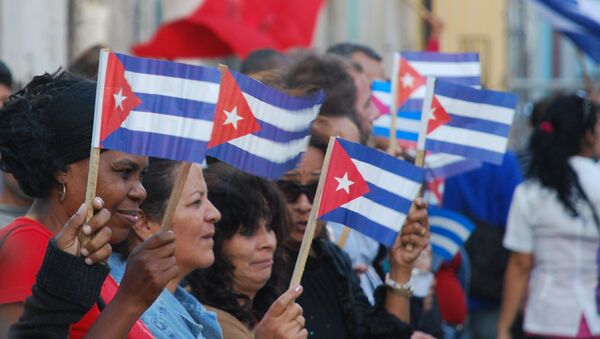RIA Novosti commentator Dmitry Babich
On October 19, 1960, the United States began its embargo of Cuba, which has become the longest economic blockade in recent history, though it was never a complete blockade.
What Washington has unwittingly proved with its fifty-year economic blockade of the island is that in this globalized world, countries can survive in near complete isolation from the main economic "world-system," a term proposed by the non-conformist American sociologist Immanuel Wallerstein. The "end of history," predicted by mainstream American intellectuals in the 1990s, is still far away.
Of course, living outside the economic world-system is not easy. Fidel Castro recently admitted this when he said from his hospital bed in September that the Cuban economic model should not be exported and that it is no longer good for Cuba.
Castro later clarified that his statement should not be interpreted as surrender to capitalism, but the economic problems in Cuba are well known and only the poorest and the least informed people in other Latin American countries still envy Cubans.
Cuba has failed to export its revolution, but nine U.S. presidents have failed to destroy the regime in Cuba with the embargo.
The stakes have gradually risen since Dwight Eisenhower, who was president when Castro seized power in 1959, prohibited Americans from travelling to the island and banned the import of Cuban sugar.
President Kennedy, seeing that Cubans had not been deterred by the ban on the exports of spare parts for U.S.-made equipment to Cuba, approved an invasion of the island by Cuban volunteers and later ordered a naval blockade.
In 1977, Democratic President Jimmy Carter lifted the ban on travel to Cuba, which had been in place since 1963, creating hope for a new dialogue between the countries. However, Carter's successor, Ronald Reagan, reinstated the ban in 1981, which has been in place, with a few exceptions, to this day.
The Cuban leadership claimed that the United States was solely responsible for the barrier dividing the nations and keeping families apart. This view has been supported by the UN General Assembly, whose numerous resolutions approved by a majority of votes since 1992 call on the United States to lift the embargo.
Israel was often the only country to side with the United States, with additional support occasionally coming from the likes of Micronesia, the Marshall Islands and Uzbekistan. But that hardly amounts to international support for the U.S. embargo of Cuba, which is why the embargo and the ban on travel to Cuba is unpopular with the American public, and American liberals in particular.
Barack Obama's decision to extend the sanctions for another year will not improve his approval numbers among liberal voters, who hailed Obama's past decision to lift the ban on phone calls to Cuba and visits by Cuban Americans to see their relatives on the island.
Continuing the embargo is becoming increasingly hard to justify morally, especially after Fidel Castro's recent statements indicating that his values have changed. The Cuban leader no longer looks like the monster he has been portrayed as in the U.S. media. At least, he has shown that he is capable of asking forgiveness for some of his past deeds.
In an interview with the Mexican newspaper La Jornada, Castro called the punishment of homosexuals practiced in Cuba in the 1960s and 1970s "a major injustice."
Under a law that was only repealed in 1979, homosexuals in Cuba were sent to jail or prison camps. In 1980, the world's attention was fixed on one of the most tragicomic episodes in the history of the U.S. embargo: 125,000 Cubans were admitted to the United States during the boatlift from Mariel in response to Washington's demand that Castro release political prisoners and other dissidents, whom Carter offered political asylum. As it turned out, many of the Marielitos were common criminals, mental patients and homosexuals.
The U.S. press wrote that it was Castro's cruel joke on Carter.
It later turned out that those wishing to emigrate to the Untied States only had to say they were homosexual. Americans were more puritanical back then, and Carter was not pleased with Castro's "present."
What has caused Castro to change his views? It could be the fact that Cuba is gradually moving towards market reforms. Fidel's brother and political successor, Raul Castro, has said recently that the number of public servants would be cut by half a million, which is a stunning figure given that Cuba has a population of 12 million. Raul also said the laid-off bureaucrats should look for jobs in the private sector, making a relic of the once popular slogan, "Socialism or Death."
Cuba is gradually becoming a part of the world-system, from which it has been barred for 50 years. Western European and Canadian businesses have long disregarded the U.S. embargo. The height of the U.S. anti-Cuban sanctions, which barred foreign companies from trading with the island, is long past.
The Cuban Liberty and Democratic Solidarity Act of 1996, proposed by Senator Jesse Helms, a prominent Russophobe, was approved at a time when the world expected the remaining socialist countries to crumble following the collapse of the Soviet Union in 1991.
But life once again proved more complex than ideological theories. Perhaps the United States should acknowledge this fact and resume relations with Cuba, at least in a limited scope, as it did with the Soviet Union during Leonid Brezhnev's rule.
The views expressed in this article are the author's and do not necessarily represent those of RIA Novosti.

